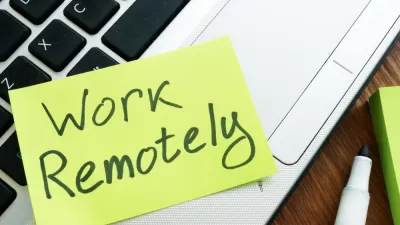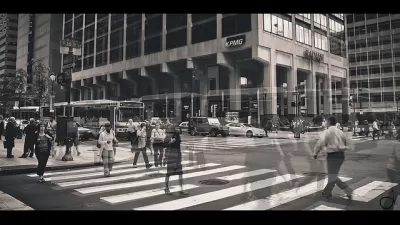Based on available data, working from home is likely to remain a popular option with a high percentage of workers, changing the ways and places Americans live, work, and travel.

Writing in the Washington Post, Andrew Van Dam analyzes the economic and demographic shifts caused by the rise of remote work. Although the rate of remote work peaked at the height of pandemic shutdowns, “it has since stabilized at an extraordinarily high level: Around a third of work was done remotely in the United States in 2021 and 2022, according to economists José María Barrero (Autonomous Technological Institute of Mexico), Nicholas Bloom (Stanford University) and Steven Davis (University of Chicago).”
According to Van Dam, remote work is having an impact in some unexpected industries. “The data hints that the real remote revolution is taking place not at tech giants but at firms like the Inside Out Co., an Illinois construction, roofing and painting outfit that has found it provides a competitive advantage.” After shifting to remote work and taking its systems into the digital space during the pandemic, the company realized it could now broaden its scope across the country. “A business that just two years ago was hyper-focused on the Chicago area now would see no problem hiring back-office personnel who could work remotely from anywhere in the country,” Van Dam writes.
The growth of remote work tracks with migration: “Notably, two of the counties with the most remote-eligible jobs, Manhattan (New York County) and San Francisco, experienced the fastest population loss of any county with more than 10,000 residents from 2020 to 2021” as people disperse to find more affordable housing or better amenities.
Understanding the full impact of these changes will require more data from federal agencies, Van Dam notes. “[U]ntil we have better federal data on who works remotely and where they do it, we can’t produce the detailed analyses necessary to understand the winners and losers of the remote-work revolution — and to deal with the inevitable fallout.”
FULL STORY: The remote work revolution is already reshaping America

Study: Maui’s Plan to Convert Vacation Rentals to Long-Term Housing Could Cause Nearly $1 Billion Economic Loss
The plan would reduce visitor accommodation by 25,% resulting in 1,900 jobs lost.

North Texas Transit Leaders Tout Benefits of TOD for Growing Region
At a summit focused on transit-oriented development, policymakers discussed how North Texas’ expanded light rail system can serve as a tool for economic growth.

Using Old Oil and Gas Wells for Green Energy Storage
Penn State researchers have found that repurposing abandoned oil and gas wells for geothermal-assisted compressed-air energy storage can boost efficiency, reduce environmental risks, and support clean energy and job transitions.

Private Donations Propel Early Restoration of Palisades Playground
Los Angeles has secured over $1.3 million in private funding to restore the Pacific Palisades playground months ahead of schedule, creating a modern, accessible space that supports community healing after recent wildfires.

From Blight to Benefit: Early Results From California’s Equitable Cleanup Program
The Equitable Community Revitalization Grant (ECRG) program is reshaping brownfield redevelopment by prioritizing projects in low-income and environmental justice communities, emphasizing equity, transparency, and community benefits.

Planting Relief: Tackling Las Vegas Heat One Tree at a Time
Nevada Plants, a Las Vegas-based nonprofit, is combating the city’s extreme urban heat by giving away trees to residents in underserved neighborhoods, promoting shade, sustainability, and community health.
Urban Design for Planners 1: Software Tools
This six-course series explores essential urban design concepts using open source software and equips planners with the tools they need to participate fully in the urban design process.
Planning for Universal Design
Learn the tools for implementing Universal Design in planning regulations.
Ascent Environmental
Borough of Carlisle
Institute for Housing and Urban Development Studies (IHS)
City of Grandview
Harvard GSD Executive Education
Toledo-Lucas County Plan Commissions
Salt Lake City
NYU Wagner Graduate School of Public Service





























